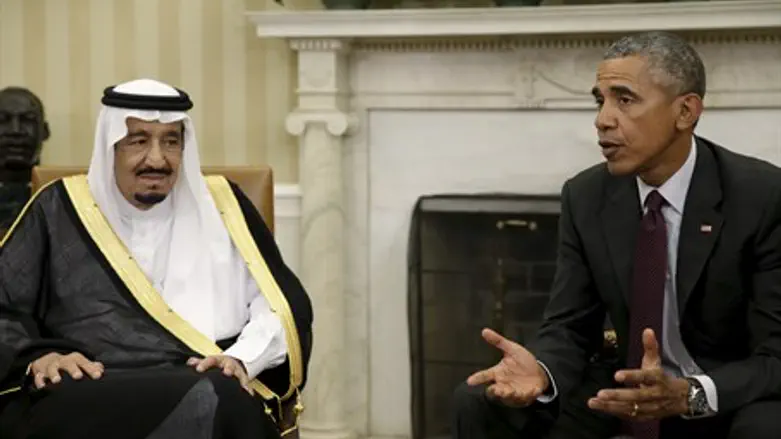
King Salman of Saudi Arabia on Friday met President Barack Obama in Washington, on his first trip to the United States since assuming the throne in January, the BBC reported.
During the meeting, according to the network, the king reiterated the concern of Gulf states over the recent deal on Iran's nuclear program.
Gulf states had been repeatedly expressing their concern about the terms of the nuclear deal with Iran, warning that a final agreement could allow Iran to keep the technologies needed to produce nuclear weapons.
They did, however, say they support the deal during a recent visit to the region by Secretary of State John Kerry.
According to the BBC, Obama pressed King Salman to ensure humanitarian organizations are given unrestricted access to Yemen, where the Saudis are leading a coalition against the Houthi rebel movement.
"We share concerns about Yemen and the need to restore a function government that is inclusive and that can relieve the humanitarian situation there," Obama said after the meeting.
The Obama administration has vowed to make certain that Iran abides by its commitments under the nuclear deal and to do everything it can to "counter Iran's destabilizing activities" in the Middle East once the country's estimated $56 billion of frozen assets are released.
In an effort to reassure its Gulf allies, the United States has been working with them to develop a ballistic missile defense system, provide special operations training, authorize arms transfers, strengthen cyber security, engage in large-scale military exercises, and enhance maritime operations to halt illegal Iranian arms shipments, noted the BBC.
Before the meeting, The Associated Press (AP) reported that the Obama administration would greet King Salman with assurances that the Iran nuclear deal comes with the necessary resources to help check the Islamic Republic's regional ambitions.
There were reports of a strain in the relations between Washington and Riyadh several months ago, when King Salman skipped a summit of Persian Gulf leaders with Obama, in which the president offered the Gulf leaders reassurances over the nuclear deal with Iran.
Saudi Arabia's foreign minister later insisted that King Salman's last minute decision not to attend the summit was not intended as a snub to the United States.
The Saudi point of view on Iran is a rare acknowledgement of agreement between Israel and Saudi Arabia, which have no formal diplomatic contact but have reportedly been growing more cooperative as the deal has progressed.
(Arutz Sheva’s North American desk is keeping you updated until the start of Shabbat in New York. The time posted automatically on all Arutz Sheva articles, however, is Israeli time.)
